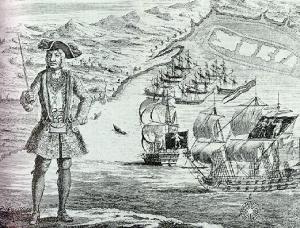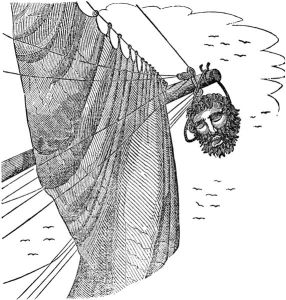In his A General History of the Robberies and Murders of the Most Notorious Pirates (1724), Capt. Charles Johnson, whoever he is, quotes “Black Bart” Roberts as saying that pirates have “Plenty and Satiety, Pleasure and Ease, Liberty and Power . . . ‘a merry life and a short one,’ shall be my motto.” Sounds great! Let’s go a-pirating!
Not so fast. First, you have to get a ship. Now, Henry Every started off with an actual warship, but they aren’t just lying around everywhere. Captain Worley set off from New York harbor in September of 1718 with eight companions in an open boat, carrying “a few Biscuits, and a dry’d Tongue or two, a little Cag of Water, [and] half a dozen old Musquets and Ammunition accordingly.” Hardly a Caribbean cruise ship! Although it’s been done in the same style in the Caribbean: Ned Lowe began with 12 men in a boat, and in 1722 John Evans began with a canoe and “three or four” companions on the coast of Jamaica.
But just think of the riches you’ll enjoy! Again, Every and his crew came away from seizing the Ganj-i-sawai with enough wealth to retire to Madagascar, the Bahamas, Pennsylvania, or England. Making the big score was the dream, one which the crews of the other ships Every cheated did not get to share in. And neither did most pirate crews. There just weren’t that many poorly defended ships with treasure sailing about. You were more likely to encounter coastal sailing ships carrying provisions, as the unfortunate Major Stede Bonnet did in his cruise off the Virginia coast in July, 1718.
Woe betide the pirate captain who failed to find enough treasure for his crew! At best, they were likely to lose crew members who took one of the prizes and sailed off in the night, as happened to Bonnet, and which happened multiple times to Black Bart. Worse, your crew might depose you or, if they were really unhappy with your performance, kill you. Capt. Thomas Anstis was shot in 1723 by some of his crew members while lying in his hammock, ending his career with his life. In the same year, Captain Lowther saved his crew the trouble: he shot himself after losing his ship while it was being careened.
But think of the plentiful supplies you’ll have, the clothes you’ll wear, the food you’ll eat! Pirates did love looting ships for fancy clothes. That’s because sea water ruined all but the sturdiest of their clothes, so they had to be replaced frequently. And no horror was worse for pirates than to run short of food and water. Why it was even worse than running short of liquor! Yet it happened far too often, for pirate crews were not careful to budget their supplies, always figuring they could steal more from the next ship they seized.
Sometimes there was no next ship when they needed one. This happened at least twice to Black Bart Roberts in 1720, in both cases because his voyage turned out to be much longer than expected. The second occasion was the more dreadful. Roberts had been sailing to Africa, but thanks to poor navigation got caught in trade winds that forced him to turn back to the Caribbean. He had 700 leagues (2400 miles) to sail with only one hogshead (maybe 60 gallons) of water for a crew of 124! As Johnson describes it,
They continued their Course, and came to an Allowance of one single Mouthful of Water for 24 Hours; many of them drank their Urine, or Sea Water, which instead of allaying, gave them an inextinguishable thirst, that killed them: Others pined and wasted a little more Time in Fluxes and Apyrexies, so that they dropped away daily: Those that sustain’d the Misery best, were such as almost starved themselves, forbearing all Sorts of Food, unless a Mouthful or two of Bread the whole Day, so that those who survived were as weak as possible for Men to be, and alive.
The pirates managed to make the coast of South America, where they obtained water from a river mouth at the coast, and soon seized provisions from a passing ship. But this no doubt explained why some of Roberts’s crew left him in another ship the next time he sailed for Africa!
It could be a miserable life, and worse yet, a short one, as Roberts admitted. He did well enough, but didn’t last three years (1719-22) as a pirate. Others had an even briefer run. Blackbeard was a pirate captain for only two years (1717-18). Howel Davis, actually one of the more clever pirates, was a captain but one single year before he was killed in an ambush in 1719. Johnson describes a Captain Worley (mentioned above) whose entire career ran from September, 1718 to February 17, 1719. And no doubt there were many pirates whose careers were even shorter and escaped Capt. Johnson’s attention!




A bit of a gamble, really. And as with gambling, the trick is knowing when to quit! But also as with gambling, everyone likes a quick win; it’s addictive. Although Depp’s Pirate movies show a fancified state of affairs, in this respect perhaps they were (almost) close to life.
LikeLiked by 1 person
Aye, their problem is that they want the jackpot at Vegas . . . and we know how often that happens!
LikeLiked by 1 person
Um . . . what are the odds?
LikeLiked by 1 person
Probably slightly better in piracy, not the thousands or millions to one of Vegas. On the other hand, losing in Vegas doesn’t usually get you killed (unless you don’t pay your debts).
LikeLiked by 1 person
“Gypped”? I thought that meant “cheated” rarher than “stolen”. As well as it being an uncomplimentary reference to Gypsies (Rom).
LikeLiked by 1 person
Well, I was using the word to mean a bit of both, which is why at first I didn’t want to change it. But I have.
What etymological information I could find in a casual search indicates that “gyp” might come from “gypsy” with derogatory connotations, though it might not, which suggests it emerged out of slang. Oddly enough, it’s supposed to have originated in the U.S., not known for its large population of Roma in the late 19th century. But I’ve seen “gypsies” used as a term to refer to nomadic strangers in U.S. Senate debates in 1866, so it’s possible, an insult to the Roma at second hand, so to speak.
LikeLike